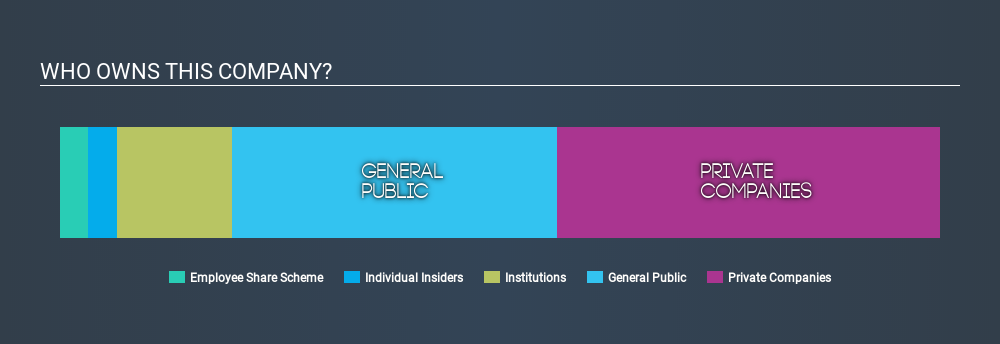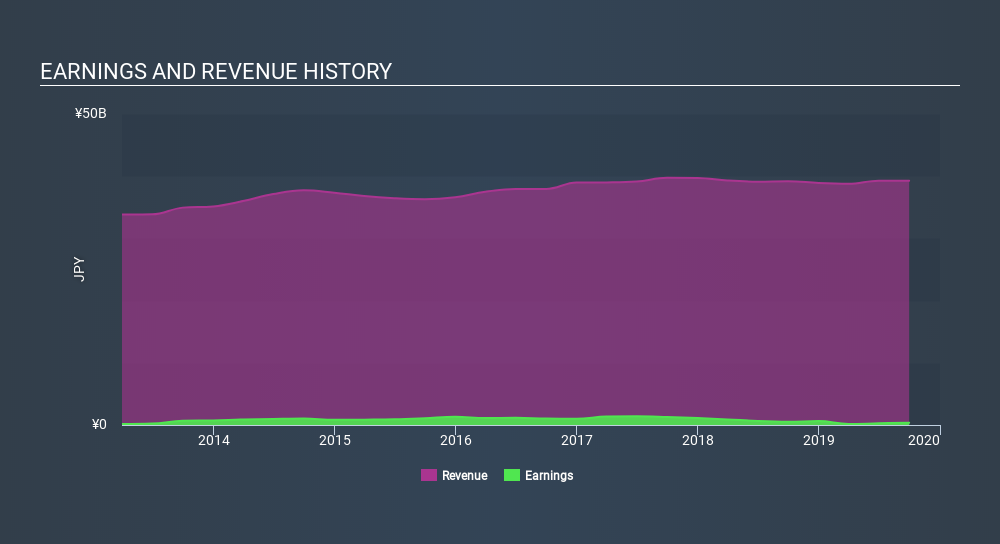- Japan
- /
- Transportation
- /
- SPSE:9085
What Kind Of Shareholders Own Hokkaido Chuo Bus Co., Ltd. (SPSE:9085)?

If you want to know who really controls Hokkaido Chuo Bus Co., Ltd. (SPSE:9085), then you'll have to look at the makeup of its share registry. Large companies usually have institutions as shareholders, and we usually see insiders owning shares in smaller companies. Companies that have been privatized tend to have low insider ownership.
Hokkaido Chuo Bus is not a large company by global standards. It has a market capitalization of JP¥12b, which means it wouldn't have the attention of many institutional investors. Taking a look at our data on the ownership groups (below), it's seems that institutional investors have bought into the company. We can zoom in on the different ownership groups, to learn more about Hokkaido Chuo Bus.
View our latest analysis for Hokkaido Chuo Bus

What Does The Institutional Ownership Tell Us About Hokkaido Chuo Bus?
Institutions typically measure themselves against a benchmark when reporting to their own investors, so they often become more enthusiastic about a stock once it's included in a major index. We would expect most companies to have some institutions on the register, especially if they are growing.
Hokkaido Chuo Bus already has institutions on the share registry. Indeed, they own 13% of the company. This can indicate that the company has a certain degree of credibility in the investment community. However, it is best to be wary of relying on the supposed validation that comes with institutional investors. They too, get it wrong sometimes. When multiple institutions own a stock, there's always a risk that they are in a 'crowded trade'. When such a trade goes wrong, multiple parties may compete to sell stock fast. This risk is higher in a company without a history of growth. You can see Hokkaido Chuo Bus's historic earnings and revenue, below, but keep in mind there's always more to the story.

Hokkaido Chuo Bus is not owned by hedge funds. Chuo Bus Sogyo Co. is currently the company's largest shareholder with 37% of shares outstanding. The second and third largest shareholders are North Pacific Bank, Ltd., Asset Management Arm and Hokuhoku Financial Group, Inc., Asset Management Arm, each holding around 5.0% of the shares outstanding.
Additionally, we found that 50% of the shares are owned by the top 4 shareholders. In other words, these shareholders have a meaningful say in the decisions of the company.
While studying institutional ownership for a company can add value to your research, it is also a good practice to research analyst recommendations to get a deeper understand of a stock's expected performance. Our information suggests that there isn't any analyst coverage of the stock, so it is probably little known.
Insider Ownership Of Hokkaido Chuo Bus
The definition of company insiders can be subjective, and does vary between jurisdictions. Our data reflects individual insiders, capturing board members at the very least. Company management run the business, but the CEO will answer to the board, even if he or she is a member of it.
Insider ownership is positive when it signals leadership are thinking like the true owners of the company. However, high insider ownership can also give immense power to a small group within the company. This can be negative in some circumstances.
We can see that insiders own shares in Hokkaido Chuo Bus Co., Ltd.. It has a market capitalization of just JP¥12b, and insiders have JP¥397m worth of shares, in their own names. It is good to see some investment by insiders, but I usually like to see higher insider holdings. It might be worth checking if those insiders have been buying.
General Public Ownership
The general public, with a 37% stake in the company, will not easily be ignored. While this size of ownership may not be enough to sway a policy decision in their favour, they can still make a collective impact on company policies.
Private Company Ownership
It seems that Private Companies own 43%, of the 9085 stock. Private companies may be related parties. Sometimes insiders have an interest in a public company through a holding in a private company, rather than in their own capacity as an individual. While it's hard to draw any broad stroke conclusions, it is worth noting as an area for further research.
Next Steps:
I find it very interesting to look at who exactly owns a company. But to truly gain insight, we need to consider other information, too. Consider for instance, the ever-present spectre of investment risk. We've identified 3 warning signs with Hokkaido Chuo Bus (at least 1 which makes us a bit uncomfortable) , and understanding them should be part of your investment process.
If you would prefer check out another company -- one with potentially superior financials -- then do not miss this free list of interesting companies, backed by strong financial data.
NB: Figures in this article are calculated using data from the last twelve months, which refer to the 12-month period ending on the last date of the month the financial statement is dated. This may not be consistent with full year annual report figures.
If you spot an error that warrants correction, please contact the editor at editorial-team@simplywallst.com. This article by Simply Wall St is general in nature. It does not constitute a recommendation to buy or sell any stock, and does not take account of your objectives, or your financial situation. Simply Wall St has no position in the stocks mentioned.
We aim to bring you long-term focused research analysis driven by fundamental data. Note that our analysis may not factor in the latest price-sensitive company announcements or qualitative material. Thank you for reading.
About SPSE:9085
Hokkaido Chuo Bus
Engages in the passenger car transportation business in Japan.
Flawless balance sheet with solid track record.
Market Insights
Community Narratives




